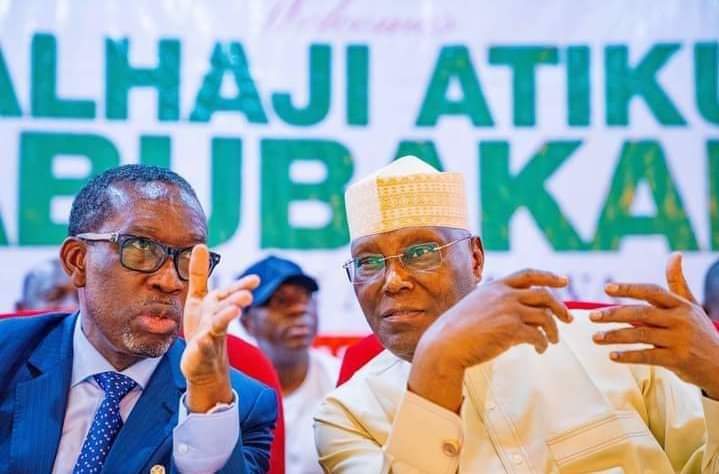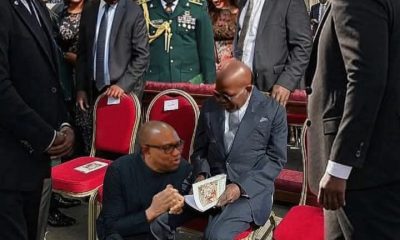OPINION
Seeing Political Defectors As Betrayers Of Voter Trust In Nigeria’s Democracy

ISAAC ASABOR
Political parties have grown to become the conduits for democratic engagement in Nigeria’s ever-changing political landscape. As evidenced by the buildup to the 2023 presidential election and the final list of candidates released by the Independent National Electoral Commission (INEC), a wide range of political parties were actively competing. These are: Accord (A), Action Alliance (AA), Action Democratic Party (ADP), Action Peoples Party (APP), African Action Congress (AAC), African Democratic Congress (ADC), All Progressives Congress (APC), and the All Progressives Grand Alliance (APGA). Others include the Allied Peoples Movement (APM), Boot Party (BP), Labour Party (LP), National Rescue Movement (NRM), New Nigeria Peoples Party (NNPP), Peoples Redemption Party (PRP), Peoples Democratic Party (PDP), Social Democratic Party (SDP), Young Progressive Party (YPP), and Zenith Labour Party (ZLP). These parties represent the wide range of ideologies and platforms available to Nigerian voters. However, a troubling trend has emerged: politicians changing allegiances after the election, leaving voters feeling used and betrayed.
During each election cycle, politicians affiliated with these various parties actively engage in campaign strategies similar to those used by brand marketers. They sell their party platforms to voters through personalised messages, populist rhetoric, and carefully curated narratives. In this light, they are not just aspirants, but political dream salesmen. Through town hall meetings, media engagements, rallies, and grassroots mobilisation, these politicians persuade thousands, if not millions, of Nigerians to support their parties’ vision. The electorate, often with little to hold on to in terms of governance dividends, places a high value on the candidates’ promises and personalities. In essence, party loyalty takes a back seat to personal loyalty to the candidate who persuades them.
It is not surprising, then, that many voters pledge their allegiance to a particular party solely because of the influence of a specific politician in whom they believe. Whether it is the Labour Party’s growing popularity among young voters, the APC and PDP’s enduring structures, or the NNPP and SDP’s growing appeal in specific regions, much of the support for these parties comes from individuals who successfully persuaded others to join their cause. In a country with low institutional trust, particularly among youth, politicians serve as liaisons between the people and the political system. This makes it even more disheartening when the same politicians turn around and abandon ship after winning elections.
Political defections in Nigeria have become a common yet dangerous occurrence. Elected officials, governors, senators, house members, and even local government chairpersons frequently switch parties, often for self-serving reasons rather than ideological ones. They cite internal wrangling, leadership crises, or the ambiguous phrase “consultations with stakeholders” as reasons for abandoning the parties that helped them gain the trust of their constituents. More often than not, these defections are motivated by a desire for political survival, relevance, or access to power and patronage within the ruling party, rather than a genuine opposition to party policies.
This trend is not only an insult to political integrity, but also a slap in the face of the electorate. Voters who cast their ballots for a specific candidate frequently do so with the understanding that they are also supporting the candidate’s party. When a candidate defected after the election, the fundamental agreement with the electorate is broken. Consider a businessman persuading you to invest in a venture based on its strong leadership, only to disappear the moment your money is invested and join a competitor. That is the type of betrayal that Nigerian voters face when politicians defect.
The tragedy is that Nigeria’s legal and constitutional framework allows for such behaviour with few to no consequences. Except for a few isolated court decisions in which seats were declared vacant due to defection, most defectors get away with it. There is no institutionalised mechanism that requires a politician who deviates from the party for which he or she was elected to vacate the seat and seek a new mandate under the new party. This legal vacuum has empowered political opportunists and reduced party ideologies to mere labels.
Even more concerning is the message this trend sends to younger generations and aspiring political candidates. It perpetuates a culture of political prostitution in which loyalty, ideology, and adherence to party manifestos are disposable. This lack of ideological discipline is a major reason why Nigeria’s democracy remains weak and underdeveloped, despite the presence of numerous political parties. Instead of strengthening party institutions and establishing long-term structures that can outlast individuals, politicians undermine the very parties that helped them rise to power by using them as temporary stepping stones.
At this point, it is not unreasonable to suggest that the electorate should begin to demand accountability from politicians, not only during campaigns but also after elections. Civic awareness must rise to the point where voters can collectively demand that defectors resign and re-contest if they want to switch parties. The judiciary must also play a role by interpreting defection laws in the interest of democratic consolidation. Electoral reform is urgently required to ensure the integrity of the mandate granted by voters.
The media and civil society have a role to play in exposing such deceptive practices. Political defectors should not be celebrated or welcomed, but rather scrutinised for their betrayal. This is more than just party loyalty; it is about respecting voters and the democratic process.
Representation is central to democratic politics. When someone is elected to office on a party platform, they are expected to uphold the platform’s values, promises, and policies. Jumping ship midway, especially without consulting the people who elected them, undermines this principle and erodes the fragile thread of trust that holds Nigeria’s democracy together. Until there is a cultural and legal shift that ends this act of political betrayal, the electorate will continue to bear the consequences of broken promises and compromised governance.
To summarise, political parties in Nigeria are not just platforms; they are social contracts. When politicians use these platforms to get elected and then abandon them without consequence, they violate the terms of the contract. The electorate deserves better. Voters deserve politicians who keep their promises, respect the mandate they were given, and recognise that leadership is more than just winning elections; it is also about upholding democratic values. Anything less is not just a political ploy; it is a betrayal.
-
CRIME3 years ago
PSC Dismisses DCP Abba Kyari, To Be Prosecuted Over Alleged $1.1m Fraud
-
FEATURED3 years ago
2022 Will Brighten Possibility Of Osinbajo Presidency, Says TPP
-
FEATURED2 years ago
Buhari’s Ministers, CEOs Should Be Held Accountable Along With Emefiele, Says Timi Frank
-
BUSINESS & ECONOMY2 years ago
Oyedemi Reigns As 2023’s Real Estate Humanitarian Of The Year
-
SPORTS1 year ago
BREAKING: Jürgen Klopp Quits Liverpool As Manager At End Of Season
-
SPORTS2 years ago
Could Liverpool Afford Kylian Mbappe For €200 million? Wages, Transfer Fee
-
ENTERTAINMENT2 years ago
Veteran Nigerian Musician, Basil Akalonu Dies At 72
-
FEATURED2 years ago
Tribunal Judgement: Peter Obi Warns Of Vanishing Electoral Jurisprudence, Heads To Supreme Court
-
BUSINESS & ECONOMY2 years ago
Oyedemi Bags ‘Next Bulls Award’ As BusinessDay Celebrates Top 25 CEOs/ Business Leaders
-
FEATURED3 years ago
2023 Presidency: South East PDP Aspirants Unite, Demand Party Ticket For Zone



































